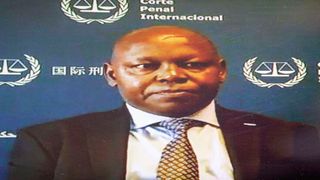
Paul Gicheru during his first appearance before the ICC on November 6, 2020.
| Pool | ICCNews
Premium
Witness in Paul Gicheru ICC case missing
What you need to know:
- The man provided investigators with information detrimental to DP William Ruto in 2012.
- The prosecution intended to call the witness in the case against Kenyan lawyer Paul Gicheru.
A key witness of the International Criminal Court (ICC) that the prosecution intended to call in the case against Kenyan lawyer Paul Gicheru has “gone missing” and is not available to give oral testimony.
According to the Office of the Prosecutor (OTP), witness P-0397 cannot be located. He was also a witness in the collapsed case that involved Deputy President William Ruto and radio journalist Joshua Sang.
The man provided investigators with information detrimental to Dr Ruto in 2012 and later stated that Mr Gicheru and others corruptly influenced him to withdraw as a witness. The information was about the 2007-2008 post-election violence in the Rift Valley.
Court filings indicate that Mr Gicheru threatened and offered the witness a bribe of Sh5 million to be paid in installments, and actually paid Sh1 million.
He deposited the money into his bank account despite Mr Gicheru’s warning not to do so to avoid detection by the ‘ICC people’. The witness had asked for a Sh10 million bribe, but the amount was negotiated downwards to Sh5 million.
His last communication with the OTP was in January 2014 when, in fear for his safety, he resumed contact with the prosecution and gave an interview about facts relevant to witness bribery.
The details of him going missing emerged yesterday when ICC Deputy Prosecutor James Stewart was urging the court to allow him to use the prior recorded testimony of the witness against Mr Gicheru.
Witness’ unavailability
Mr Stewart said the witness has not been located since, despite extensive efforts. The evidence recorded by the witness is mostly relevant to the bribery charges against Mr Gicheru, and to his alleged criminal liability.
“The prior recorded testimony should be accepted as formally submitted because the witness is unavailable and the documents are reliable,” said the prosecutor.
He argued that the fact that the witness’ prior recorded testimony goes to the acts and conduct of the lawyer should not preclude its introduction.
Particularly because there are strong indications that the witness’ unavailability resulted from interference deployed for the benefit of members of the ‘Common Plan’ to interfere with witnesses. Common Plan was a network group whose scheme was to corruptly influence witnesses that had been lined up against Dr Ruto.
“The prosecution also seeks to introduce the transcriptions and English translations of P-0397’s interview in January 2014 for the truth of their content, as they are directly relevant to the charges in this case, and items provided by P-0397 during the interview,” said Mr Stewart.
He wants to introduce 22 transcripts of interviews, their translations and 15 associated exhibits related to the missing witness.
Mr Stewart also said another witness, identified as P-0495, is unavailable to testify against Mr Gicheru due to continued witness interference, thus the prosecution should be allowed to use his prior recorded statement.
Incriminating evidence
The witness’ identity was disclosed to the defence in the Ruto/Sang case on March 13, 2013.
He was bribed to withdraw his evidence in the Ruto/Sang case and was also involved in corruptly influencing other witnesses to recant their testimonies.
However, on the night of September 13 and 14, 2013, with no prior warning, the witness disappeared from his accommodation and failed to respond to all subsequent attempts by the prosecution to reach him.
On September 16 and 22, 2014 he appeared before the ICC to give testimony remotely. He repudiated almost the entirety of the incriminating evidence he had originally provided in his statement to the prosecution.
“Since then, all efforts employed by the prosecution to locate and contact him have failed. As a result, the prosecution is unable to secure his attendance as a witness in the Gicheru case. The prosecution considers that his continued unavailability is the result of witness interference,” said Mr Stewart.
Mr Gicheru, through his defence counsel Michael Karnavas, asked the court to extend the deadline for the responses to the prosecution’s applications for the introduction of prior recorded testimony by one month, to December 2021.




